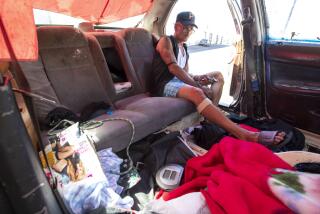Tragedy’s Voice : Vietnamese Boy Will Tell Congress of Boat People’s Plight
- Share via
WESTMINSTER — Ngo Van Ha is a 16-year-old orphan who speaks little English. But today he will testify before a congressional subcommittee, and what he has to say may influence national policy on the estimated 50,000 Vietnamese boat people still languishing in refugee camps in Hong Kong and Southeast Asia.
Local refugee rights activists say the frail teen-ager, barely five feet tall, personalizes what they describe as a continuing tragedy.
“He presents a human dimension to the tragedy of the boat people,” said Van Tran of the Westminster chapter of Legal Assistance for Vietnamese Asylum Seekers. “If a pale child can speak before a powerful committee, it will send a message to the authorities running the camps.”
Ha arrived in the United States April 12 after spending four years at a Hong Kong refugee camp, where he became a celebrity of sorts by surviving repeated attempts by the Hong Kong government and the U.N. High Commissioner for Refugees to send him back to Vietnam.
Ha was orphaned at 10, when his parents died in a bus accident in Vietnam. He lived with relatives until he was 12, then fled Vietnam by boat with 35 other people and wound up in the Hong Kong refugee camp.
Last year, the High Commissioner for Refugees attempted to send Ha back to Vietnam, but his relatives there did not want him because they could not afford to raise him.
The relatives who did want him--a distant aunt and uncle in San Gabriel--were not allowed to bring him to the United States until a barrage of publicity in the Hong Kong media and efforts by lawyers from refugee rights groups forced the high commissioner to grant him refugee status.
Now, Ha wants to be the voice of those left behind in the refugee camps.
“I want to speak about the conditions in the refugee camps,” he said through an interpreter before leaving for Washington. “I want to repay those who have helped and took care of me.”
Ha is one of 13 Indochinese refugees who will appear before the House subcommittee on East Asia and Pacific affairs, which is investigating cases involving Vietnamese refugees in Hong Kong and Hmong refugees in Thailand.
Congressional leaders want to find out if there is an “institutional bias” in the way certain cases, especially those involving children, are being handled by U.N. High Commissioner for Refugees investigators.
Refugee advocates said they hope that Ha’s testimony will also help stop the forced repatriation of refugees to Vietnam and speed up the screening process for those seeking asylum in other countries.
“This is not an immigration issue but a human rights issue,” said Lan Nguyen, an attorney for the Vietnamese asylum-seekers group.
Nguyen said that at a time of strong anti-immigrant sentiments, it is hard to overcome negative public perception about refugees. And although the group he represents is advocating the resettlement of refugees, it is not suggesting that they all be resettled in the United States, he said.
But the public has to be educated about the abuse of the refugees at the camps, he said.
Many refugees are summarily denied refugee status, Nguyen said. In an effort to empty the camps, the U.N. High Commissioner for Refugees and the host countries have removed health clinics and other services, triggering protests from refugees that sometimes end in violence, he said.
Last week, the Southeast Asian Resource Action Center in Washington, which provides medical and other services to refugees, reported that Hong Kong police used tear gas to break up a group of nearly 2,000 protesting refugees.
Werner Blatter, the U.N. High Commissioner for Refugees bureau director for Asia and Oceania, met with Vietnamese community leaders this year in several U.S. cities. In a Jan. 14 meeting with Orange County Vietnamese leaders, he said the problems of violence and medical care in the camps will be addressed.
More to Read
Sign up for Essential California
The most important California stories and recommendations in your inbox every morning.
You may occasionally receive promotional content from the Los Angeles Times.












